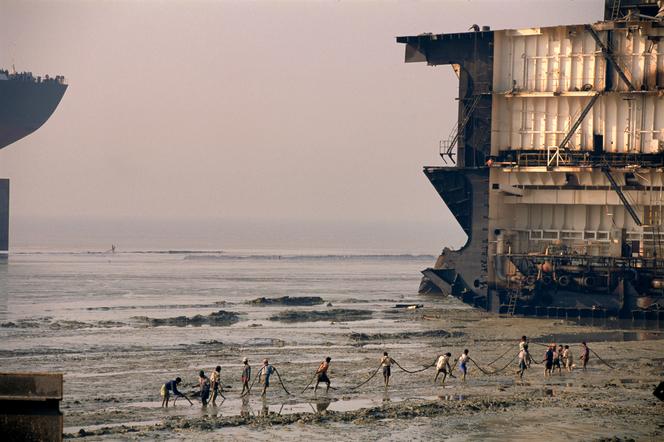


The beaches of Chittagong, Bangladesh, are the graveyards where end-of-life ships are run aground. Cruise liners, container ships, bulk carriers and tankers arrive from all over the world to be dismantled in conditions that are dangerous for shipyard workers and for the environment, as NGOs have been warning for over a decade. In a report published on Thursday, September 28, Human Rights Watch (HRW) documents an ongoing situation and "how the shipping industry circumvents regulations."
Alongside Alang in India and Gadani in Pakistan, the beaches of Chittagong represent the world's largest shipbreaking operations. Since 2020, some 20,000 Bangladeshi workers have dismantled more than 520 ships in some 30 "yards," on behalf of companies that then resell the metal and other materials extracted from the vessels. It is a lucrative industry (estimated at over $2 billion a year) for a poor country like Bangladesh, but one with little regard for working conditions or the environment.
The International Labor Organization considers shipbreaking to be one of the most dangerous activities in the world. HRW collected testimonies from some 40 workers. "If I get distracted even for a moment, I can die immediately," summed up one laborer from Chittagong.
The human rights association also relies on doctors' accounts: They have documented fatal falls, severed legs, poisoning, burns, etc. The Shipbreaking Platform NGO, which collaborated on the report, mentions "hundreds" of injuries and deaths over the last decade, without being able to give precise figures. The life expectancy of workers is said to be 20 years less than that of Bangladeshis (71.8 years).
The "beaching" technique is common in Chittagong. Ships sail near the coast and run aground at high tide. They are then dismantled directly on the sand, exposing workers to the toxic materials contained within them: asbestos, fuel oil... which spill onto the sand and into the ocean. Most of the time, workers operate without any protective equipment. They tell us they use their socks as gloves to avoid burning their hands when cutting steel, or, in the absence of masks, they use their shirts to avoid inhaling toxic fumes.
In 2009, Bangladesh's High Court ordered all shipbreaking yards to comply with a directive designed to ensure respect for workers' health and safety rights. "Yards have ignored these regulations and continue to operate, in many cases, without adequate protective equipment, without facilities, and employing children as young as 13 years of age," said Julia Bleckner, a researcher at HRW's Asia division.
You have 38.06% of this article left to read. The rest is for subscribers only.
